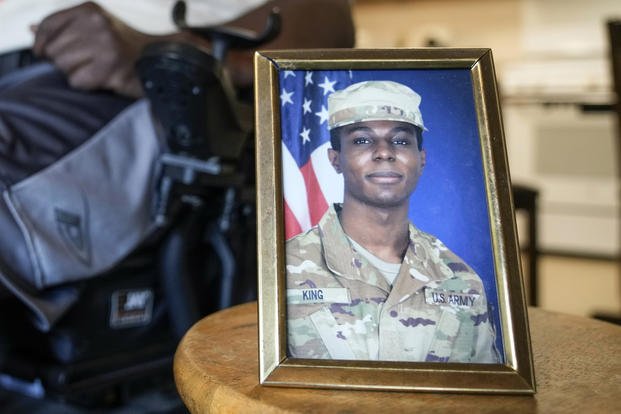Pvt. Travis King — the young soldier who ran across the border into North Korea in July, triggering fears about a hostage situation before he was released without conditions in September — is now facing eight different charges from the Army, including desertion and child pornography.
King’s charge sheet, which was reviewed by Military.com, alleges that, in the days before the private dashed across one of the most heavily guarded borders in the world, he solicited nude images from an underage Snapchat user and possessed a video of a minor engaged in sexual activity.
The charges also allege that King was insubordinate toward his superiors in the fall of 2022, during a period in which he faced separate legal troubles in Seoul for allegedly assaulting locals and vandalizing a police car. He’s also accused of assaulting an officer and lying to superiors.
Read Next: The Army Needs a Lot of Money for Barracks, But It’s Fighting for Pocket Change
King’s mother, Claudine Gates, said that she loves her son “unconditionally” and she is “extremely concerned about his mental health,” in a statement provided by family spokesman Jonathan Franks.
“As his mother, I ask that my son be afforded the presumption of innocence,” Gates said, adding that she believes “something happened to [King] while he was deployed.”
Questions about the circumstances of King’s departure for North Korea, including allegations by local South Korean law enforcement, remain.
King was accused of assault on Sept. 25, 2022, according to reporting from several outlets citing court records. Seoul police alleged he pushed and punched a patron at a bar who refused to buy him a drink. Those charges were ultimately dropped.
Then, two weeks later, just before 4 a.m. on Oct. 8, 2022, King was arrested in Mapo, South Korea, and placed in a squad car. He allegedly refused to answer questions, kicked the car’s doors and ranted: “F— Korean, f— Korean army, f— Korean police,” ultimately being fined about $3,950 and paying nearly $800 for damage to the police car, according to reports.
The charging documents show that the repercussions from Army leadership following those incidents were swift.
Between Sept. 30, 2022, and Oct. 8, 2022, an Army captain repeatedly ordered King not to leave the pair of Army bases that are situated between Seoul and the Demilitarized Zone that borders North Korea; to be escorted when he was outside his barracks; and not to drink alcohol. The charging documents allege that he violated all those orders.
Another series of charges stems from King’s alleged behavior on Oct. 8, 2022.
The charges claim that three soldiers — a staff sergeant and two sergeants — were sent to “apprehend” King. King, in turn, attempted to escape from them and, in the process, kicked the staff sergeant in the head.
A separate assault charge alleges King also struck a second lieutenant in the head that day.
NBC reported that King was ultimately detained by South Korea for 48 days over failing to pay the fines leveled at him over his actions in Mapo that October.
Once released from a South Korean prison, the Army was ready to send him back to Fort Bliss, Texas, to face additional military discipline. Instead, he somehow ended up on a civilian tour of the border village of Panmunjom, a major tourist attraction, where he proceeded to dash into North Korea on July 18.
The move stunned Army leaders.
Secretary of the Army Christine Wormuth said that King “may not have been thinking clearly, frankly, but we just don’t know,” days after his flight to North Korea.
King was ultimately returned to U.S. officials on Sept. 27, 2023, according to the date range of his desertion charge. The American media would report the story the next day.
Franks revealed that King will be defended by five lawyers including Franklin Rosenblatt, the same attorney who served as lead military defense counsel for Bowe Bergdahl’s court-martial on desertion charges.
The choice is notable since Bergdahl’s situation is perhaps the closest parallel to King’s.
Bergdahl was a soldier in the 1st Battalion, 501st Regiment, who walked away from his post in Afghanistan and was captured by the Taliban, triggering a military search, in 2009. He was held captive for five years before finally being released in a prisoner swap for five U.S. detainees. Despite his long captivity, military officials still charged the soldier with desertion and misbehavior before the enemy.
Bergdahl’s legal trials ended up lasting for years and drew scores of controversy and debate. Despite the fact that the military ended up securing an initial conviction at court-martial — Bergdahl pleaded guilty in 2017 — that decision was later overturned on appeal and the case is still being litigated to this day.
— Konstantin Toropin can be reached at konstantin.toropin@military.com. Follow him on X at @ktoropin.





